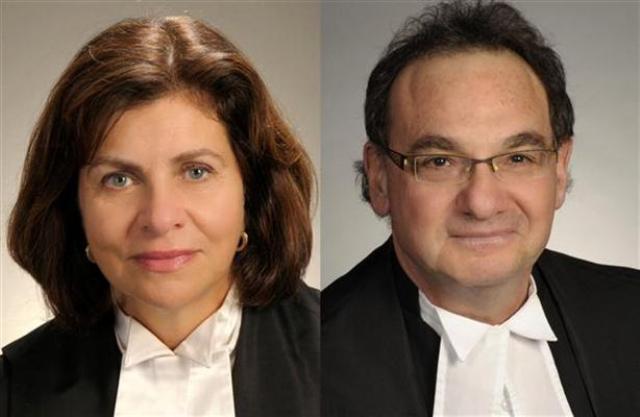OTTAWA – Some courts observers are raising questions about Prime Minister Stephen Harper’s top picks for Canada’s top court.

Five months after Supreme Court of Canada Justices Ian Binnie and Louise Charron announced their retirements, Harper unveiled their potential successors Monday.
Justice Michael Moldaver and Justice Andromache Karakatsanis have been nominated to fill the vacancies at the Supreme Court.
Affirming speculation from the legal community, both appointees served on the Ontario Court of Appeal.
Bruce Ryder of York University’s Osgoode Law School said both judges will do a good job, but the appointments were “disappointing.”
“The Ontario Court of Appeal is the best court in the country and it is jammed packed with stellar jurists and I think the government could have done a lot better,” he said.
Karakatsanis is the first Greek-Canadian to be appointed to the top court and is trilingual. She has worked up the ranks of legal profession through the public service and spent time working in non-partisan positions under the Mike Harris Conservative government, which included the current federal finance minister Jim Flaherty.
Karakatsanis was Ontario’s Secretary of the Cabinet and Clerk of the Executive Council from 2000 to 2002. She worked as Deputy Attorney General and Secretary of the Ontario Native Affairs Secretariat. Karakatsanis She has also worked as chair and CEO of the Liquor License Board of Ontario.
She was appointed to the Ontario Court of Appeal in March 2010.
“She is the junior member of the Ontario Court of Appeal. She has limited experience in the issues that are going to occupy most of the court’s time,” said Ryder. “This process passes over all of her more senior colleagues many of whom have far more experience on the bench and writing opinions.”
University of Ottawa law professor Carissima Mathen says Karakatsanis’ less trodden path to the Supreme Court bench is positive.
“There are a number of ways to practice law and there are number of ways that issues come before the courts,” she said.
Questions about Moldaver surround his candid opinions.
Moldaver has been serving on the bench of Ontario’s top court since 1995 and has a vast experience in criminal law.
“He is extremely experienced in terms of criminal law and that is a big part of their docket and the Supreme Court has lost some of that experience with the retirements of Justices Charron and Binnie,” says Ryder.
Moldaver is known for his outspoken opinions on the Charter of Rights and Freedoms and the performance of Canada’s defence lawyers – who he took to task in a 2006 speech, accusing them of slowing down cases using unnecessary Charter motions concerning how police collect evidence. Part of the speech also hypothesized that part of the motivation for lawyers to do so was to earn higher fees.
Burstein said that Moldaver has always been an “ardent defender of the factually innocent,” but that recently he has developed a more “distinct ideology.”
“We have long disagreed with his view that defence counsel are to blame for long trials and are comforted by the reports showing that we do not control the length of criminal cases,” he says. “Hopefully, we will now see a return to his earlier way of thinking about criminal justice and the Charter.
Comments like those made by Moldaver should not be “blown out of proportion” says Mathen.
“(Commenting on justice issues) is something they are well-placed to do because they have the day-to-day experience,” she says. “I would not expect that to influence how a particular judge practices law.”
The critiques of the judges highlight problems with how judges are selected, according to Ryder.
“The process should be merit-based and this doesn’t look to be the result of a merit-based process,” he said.
While neither of these judges will make decisions according to government polices, goals or ideology, Ryder said, they do share Harper’s view on the role of the court.
“(They) seem to adhere to his general ideology about a restrained role for the judiciary in holding the government to account,” he says.
A pool of qualified candidates was selected by the Minister of Justice in consultation with the Attorney General of Ontario, senior judges and members of the public. The list was then reviewed by a panel of five MPs, which included one Liberal and one NDP.
The panel unanimously chose six candidates to forward to the prime minister and Justice Minister Rob Nicholson, who selected final two nominees.
Both nominees will be appearing before an ad hoc parliamentary committee of MPs from all parties on Wednesday.



Comments